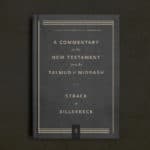
The Pharisees are my friends and ancient Romans are my companions.
This is because I’ve spent so much time in ancient literature. After doing a doctorate in rabbinic studies, it seemed that my New Testament had altered. It no longer contained obscure concepts and strange language—it was full of the concerns and terminology of my ancient friends and companions. Now I’m a research fellow at Tyndale House so I have time to explore this even more.
After a decade of sharing these new insights in sermons, magazine articles, and academic papers, my wife persuaded me to pull them together for those who—unlike me—don’t live in the first century.
Church Doctrine and the Bible: Theology in Ancient Context explores Bible doctrines through the eyes of the first Christians. These first-century Jews and Romans, who recognised Jesus as their Messiah, brought a lot of baggage with them. But we also have baggage: two thousand years of theological developments. It can be refreshing to put aside this valuable theological heritage and look at the texts again, but through their eyes instead of ours.
When we read only with modern eyes, we stumble into problems. The Gospels appear to tell us that moving mountains takes only a grain of faith because we understand words and concepts differently.
Words like ‘sovereignty’ didn’t imply predestination to them. Rather, it reminded them that God is king: a sovereign. The word “atonement” is now a theological term referring to the whole process of soteriology, but for a first century believer it meant the same as ‘reconciliation’—i.e. getting back together with someone.
Concepts like baptism weren’t new because most Jews baptised themselves every day. They easily saw its significance in the ways that Christian baptism was both similar and different. The unforgivable sin was well known to Jews, so they recognised that Jesus’ startling teaching concerned the Holy Spirit – though we get distracted wondering what the sin is.
We think that sacrifices represent pain and punishment, whereas both Jews and Romans practiced pain-free killing of offerings. In fact, if they experienced pain, the sacrifice was invalid. So what did it mean to them that Jesus is a sacrifice?
In Church Doctrine and the Bible, I’ve written about these topics for modern readers who don’t have much time. The chapters are short and self-contained. They can be finished in a coffee break and any of them can turn into a sermon or a conversation starting: ‘did you know..?’ And, even better, they can make the Bible come alive for you like it has for me.
This guest post is written by David Instone-Brewer, author of Church Doctrine and the Bible: Theology in Ancient Context (Lexham Press, 2020).







